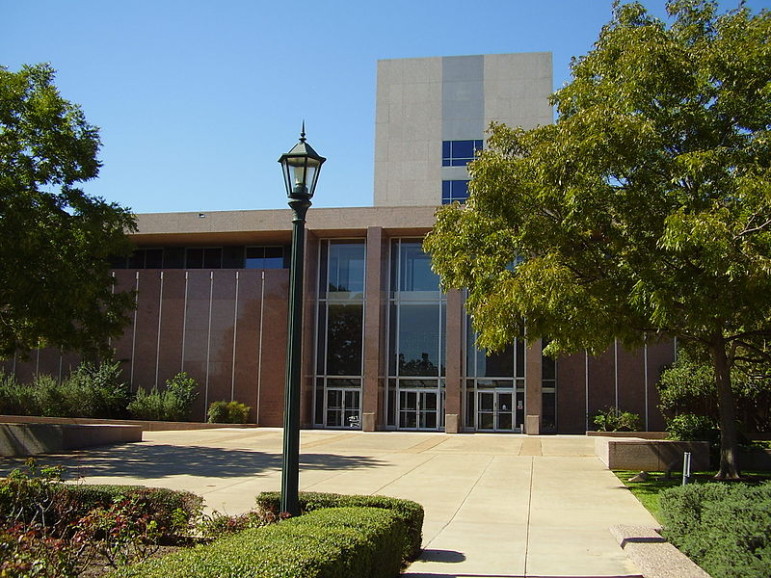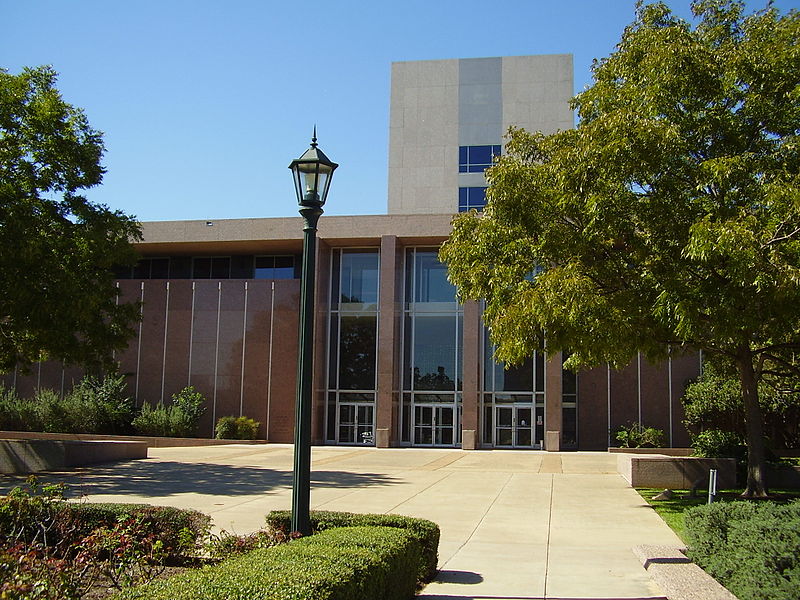
WhisperToMe / Wikipedia / CC
The Texas Supreme Court Building, which houses the Texas Court of Criminal Appeals.
From El Paso Times, Texas / (MCT)
AUSTIN -- There was broad agreement last week among policy makers and corrections officials that the age at which the criminal courts consider Texans to be adults should be raised to 18.
But during a legislative hearing, there was universal agreement that doing so would have a profound impact on county budgets and staffing charts. Juvenile justice officials urged lawmakers to work slowly and phase in the changes over years.
At the same time, members of a separate legislative committee said that after years of reforms, state facilities for the most serious juvenile offenders continue to be plagued with problems.
Texas criminal courts have regarded 17 as the age of adulthood since 1918. But recent U.S. Supreme Court decisions conflict with the law in some ways, prompting Texas and the eight other states to consider making 18 the age at which criminal offenders are sent into the adult legal system.
The changes reflect a growing consensus that the juvenile-justice system is more effective at rehabilitating youthful offenders, that teenaged brains are not fully formed and that it's just not fair to treat 17-year-olds as children in most ways, but not when they run afoul of the law.
"I don't think it's right to say the only way you can be an adult is to commit a crime," Jeanne Meurer, a senior Travis County Juvenile Court judge, told the House Criminal Jurisprudence Committee last week.
House Speaker Joe Straus, R-San Antonio, tasked the committee to study the changes before the next legislative session begins in January 2015. Typically, committees use such "interim charges" to craft legislation for the ensuing session.
As a practical matter, Supreme Court decisions have already forced the Legislature to tinker with the current law to facilitate some prosecutions – including a high-profile case in El Paso.
In a special session last summer, the Legislature passed a law allowing 17-year-olds convicted of capital crimes to be jailed for 40 years without the possibility of parole.
The law came in response to a U.S. Supreme Court ruling that such offenders could not be imprisoned for life. The court already had ruled that such offenders could not be put to death.
Without the new law, there was no constitutional sentence for Juan Antonio Gonzalez, who was charged with capital murder in the 2012 beating death of Jonathan Molina, an El Paso police officer. Gonzalez was 17 at the time of his arrest and capital murder carries an automatic lifetime prison sentence, said state Rep. Joe Moody, D-El Paso, a member of the Criminal Jurisprudence Committee and a former assistant district attorney.
Moody said state officials discovered about 30 such cases in Texas in the wake of the Supreme Court ruling that juveniles can't be sentenced for life.
Michele Deitch, a senior lecturer at the University of Texas' LBJ School of Public Affairs, oversaw a study of juvenile justice in Texas and the effect of raising the age of youths who would be channeled into the system.
In terms of crimes committed by Texas' 17-year-olds, the "vast majority" are misdemeanors such as larceny, theft, marijuana possession, disorderly conduct, burglary, vandalism and assault, she said.
Of the 17-year-olds who are in custody, 70 percent suffer some form of mental illness, she said, adding that services for youths are hard to come by in the adult penal system.
Also making adult lockups inappropriate for teenagers, Deitch said, is that 17-year-olds who are locked up are more likely to be assaulted or abused and they're 30 times more likely to attempt suicide than their peers who are not in adult jails or prisons.
"Texas has been an outlier on this issue both nationally and internationally," Deitch said.
For those juveniles committing the most serious crimes, courts would still have the option to certify them as adults and send them to prison, Deitch said.
Rep. Terry Canales, D-Edinburg, said adult jails serve as crime schools for teenagers lodged in them.
"I don't think we're doing our society any good service putting these people in the state prison system," said Rep. Lon Burnham, D-Fort Worth.
Deitch said Texas' juvenile-justice system in Texas offers a range of services intended to keep teenagers from re-offending.
"In contrast, the jails offer virtually nothing in this regard," she said.
Jason Wang says he's an example of how effective the juvenile system is. He was convicted of armed robbery in 2005 as a juvenile and for three years he was housed in facilities run by what was then known as the Texas Youth Commission and now is known as the Texas Juvenile Justice Department.
While in the system, Wang got his GED, earned college credit and helped other inmates further their education. Now he holds two masters' degrees and owns a business.
"I think that TYC helped me get away from bad influences," Wang told the committee.
Not everybody agrees that Texas' youth-detention centers are model facilities, however.
The name of the Texas Youth Commission was changed after a 2007 scandal in which staffers at TYC facilities were sexually abusing the youths housed there.
On Tuesday – the same day as the House hearing – outraged members of the Senate Criminal Justice Committee ordered the immediate inspection of all five state-run juvenile-detention facilities. They did so in response to an inspector's report, saying that a December inspection showed that staff members left cell doors unlocked at the Evins Regional Juvenile Center in Edinburg so that youths could fight in their cells, the Houston Chronicle reported.
Sen. John Whitmire, D-Houston, said that after seven years of reforms "this agency appears to still be broken," the newspaper reported.
Another problem associated with raising the age for which Texans qualify for the juvenile justice system is the increased cost.
Doing so would shift greater expenses onto counties, which shoulder the most of the expenses for juvenile justice.
"That's the biggest concern I've heard," Moody said.
Also, counties would have to realign their staffs, perhaps retraining some adult probation officers to work with juveniles, adding juvenile court judges and building or expanding facilities to house serious offenders.
"You've got to change a lot of different laws if you're really going to do this," said Riley Shaw, chief juvenile prosecutor in the Tarrant County District Attorney's office.
Several of those who testified said the burden of a change would fall most heavily on small counties, which have small staffs and are likely to have more difficulty making adjustments.
Shaw recommended that the Criminal Jurisprudence Committee take its time studying the issue and gradually implement any changes.
Marty Schladen may be reached at 512-479-6606.
———
©2014 the El Paso Times (El Paso, Texas)
Visit the El Paso Times (El Paso, Texas) at www.elpasotimes.com
Distributed by MCT Information Services
